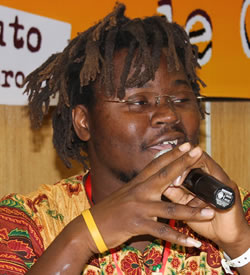

Follow these links to find out more about the Health Policy Project's related work.
- Learn about HPP's work involving Gender
- Explore HPP publications that relate to GBV
- Read about HPP's activities in Mozambique
Organization: HOPEM (Men for Change Network)
Country: Mozambique
Area of Response to HIV: Gender, Male Engagement
Interview was originally published in the June 2014 newsletter.
Interview with Julio Langa
Julio Langa is the co-founder and national coordinator of HOPEM (Men for Change Network) in Mozambique. HOPEM is a coalition of 25 non-governmental organizations (NGOs) and activists that works to affirm the human rights of Mozambican men, women, and children. It works in the areas of masculinity and gender to change behaviors, reduce discrimination, and promote gender equality in Mozambique. The HIV Policy and Advocacy Monitor spoke with Julio about his work and passion for gender equality.
HIV Policy and Advocacy Monitor: Tell us about your organization.
We are a network of 25 NGOs and human rights defenders with a focus in five areas: sexual and reproductive health (SRH), gender equality advocacy, gender-based violence (GBV), organizational development, and peace building.
Under these pillars, we implement several programs. We train journalists and media personnel on SRH, gender equality, and GBV, as well as engage artists and athletes who influence public opinion within their communities and the country as a whole. We also have a weekly broadcast on national television called "Homem Que é Homem" (Real Man) which promotes new masculinity norms.
Another of our activities to promote education and awareness is "Men in the Kitchen," a television program in which we encourage men, particularly young men, to participate more actively in maintaining the household. This is also a way to challenge constructions (or concepts) of masculinity and femininity and change power relationships within the home. The issues that the program addresses have been previously identified in focus group sessions, where men expressed that they felt they did not have opportunities to take action to support women and girls. "Men in the Kitchen" is an opportunity for them to develop their own skills and assume household responsibilities.
HIV Policy and Advocacy Monitor: Why did you get involved in this work?
I am involved in this work because I want to make my contribution to the world. As a human being, I have a responsibility toward others, especially women. I want to make my contribution, especially to the women in my life-my sisters, my nieces, my friends, and all their future daughters-and I don't want them to have the same challenges women in my country face. I want them to have equal opportunities and to realize their own potential and explore it as they wish and deserve.
HIV Policy and Advocacy Monitor: Why is male engagement important in preventing gender-based violence?
No one was born violent. People learn to be violent and people can unlearn this behavior. I think community mobilization, advocacy, and informational workshops are important to give men and boys an opportunity to realize they can be a man without using violence. It is important to make them aware of men's role in preventing gender-based violence and encourage them to stake a claim in fighting against GBV. In addition, dominant masculinity norms harm not only women's but also men's health, because they lead men to engage in risky behaviors such as having multiple sexual partners, and heavy alcohol and drug consumption.
HIV Policy and Advocacy Monitor: What are some of the political or social issues that affect gender-based violence in Mozambique?
Male involvement in preventing GBV needs to be more widely addressed. We have national legislation against domestic violence but we do not have a clear vision of how to change perceptions of masculinity. Recognition of the importance of male engagement by the government and donors is a necessary step in eliminating GBV. Despite significant work by civil society to address male engagement, there are still large gaps in the national policy which must be addressed to provide a comprehensive approach to GBV issues.
In addition to policy gaps, there are many challenges related to culture and education. Existing traditions give men a certain level of privilege, and men are resistant to changing these traditions. Many people don't see the benefits of gender equality or that gender equality and nonviolence can improve the lives of women, children, and men. This is one of HOPEM's main efforts: helping men and boys understand how important gender equality is to them and what kind of benefits they can receive from gender equality. Societal norms for masculinity put men and boys at risk of contracting HIV by taking multiple sexual partners. With greater gender equality, men and boys don't need to live with this risk.More information on Julio Langa's work can be found here:
http://www.hopem.org.mz/ (In Portuguese)
http://www.facebook.com.com/rede.hopem
http://www.unwomen.org/en/news/stories/2013/7/men-in-the-kitchen/